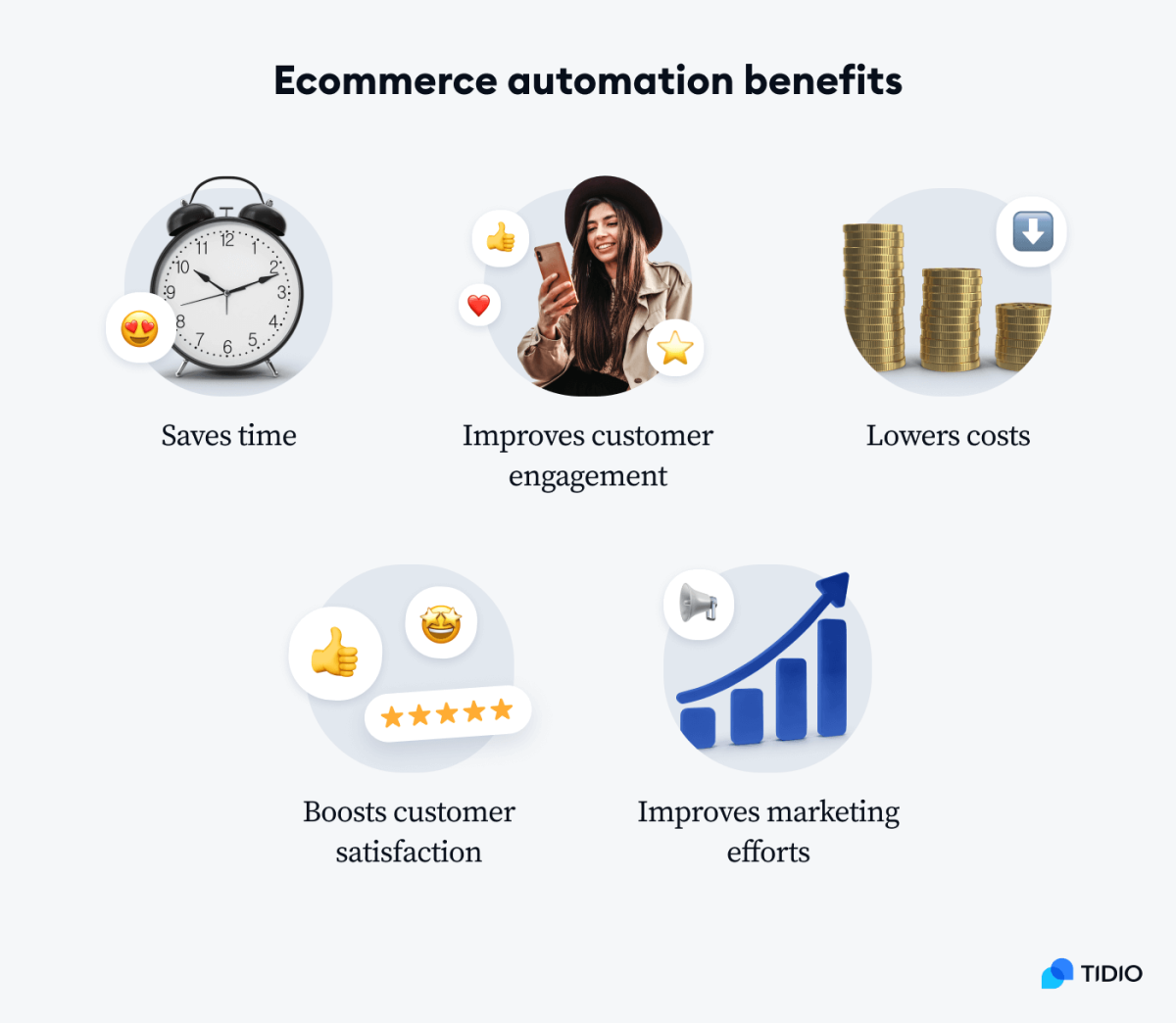Starting with Intelligent Automation in eCommerce: Boosting Sales & Efficiency, the discussion unfolds in a captivating and unique manner, inviting readers into a narrative that is both informative and engaging.
The following paragraph will delve into the specifics of the topic, providing a clear and descriptive overview.
Introduction to Intelligent Automation in eCommerce

Intelligent automation in eCommerce refers to the use of advanced technologies like artificial intelligence and machine learning to streamline and optimize various processes within online retail businesses. By automating repetitive tasks and leveraging data-driven insights, intelligent automation enables eCommerce companies to operate more efficiently and effectively.Some benefits of implementing intelligent automation in eCommerce include:
1. Improved Efficiency
Intelligent automation can handle routine tasks such as order processing, inventory management, and customer service inquiries faster and with fewer errors than human employees. This leads to increased productivity and reduced operational costs.
2. Personalized Customer Experiences
By analyzing customer data and behavior patterns, intelligent automation can tailor product recommendations, marketing messages, and pricing strategies to individual preferences. This level of personalization enhances customer satisfaction and boosts sales.
3. Optimized Inventory Management
Intelligent automation can forecast demand, track inventory levels in real-time, and automatically reorder stock when necessary. This helps eCommerce businesses maintain optimal inventory levels, reduce stockouts, and minimize storage costs.
4. Enhanced Fraud Detection
With the ability to analyze large volumes of data in real-time, intelligent automation can identify fraudulent activities and suspicious transactions quickly. This helps eCommerce companies protect themselves and their customers from online fraud.Examples of how intelligent automation can enhance sales and efficiency in eCommerce businesses include:
- Using chatbots powered by natural language processing to provide 24/7 customer support and answer common queries.
- Implementing recommendation engines that suggest relevant products to customers based on their browsing history and purchase behavior.
- Employing dynamic pricing algorithms that adjust product prices in real-time based on market demand, competitor prices, and other factors.
By harnessing the power of intelligent automation, eCommerce businesses can stay competitive in a rapidly evolving digital landscape and deliver exceptional shopping experiences to their customers.
Implementing Intelligent Automation in eCommerce

Implementing intelligent automation in an eCommerce setting involves several key steps to ensure a successful integration of automated processes. By following these steps, businesses can streamline operations, improve efficiency, and boost sales.
Key Steps in Implementing Intelligent Automation in eCommerce
- Assess Current Processes: Before implementing automation, it is crucial to evaluate existing processes to identify areas that can benefit from automation.
- Set Clear Objectives: Define clear objectives and goals for automation to ensure alignment with business strategies and priorities.
- Choose the Right Tools: Select automation tools and software that best suit the specific needs and requirements of the eCommerce business.
- Implement in Phases: Roll out automation in phases to manage the transition smoothly and address any issues effectively.
- Train Employees: Provide training to employees to ensure they are comfortable with the new automated processes and can maximize their potential.
- Monitor and Optimize: Continuously monitor the performance of automation processes and make necessary adjustments to optimize efficiency.
Comparison of Different Automation Tools in eCommerce
- Robotic Process Automation (RPA): RPA tools can automate repetitive tasks and streamline workflows in eCommerce operations.
- Chatbots and Virtual Assistants: AI-powered chatbots and virtual assistants can enhance customer service and support through automated interactions.
- Inventory Management Systems: Automation tools for inventory management can optimize stock levels, reduce errors, and improve order fulfillment processes.
- Personalization Software: Automated personalization tools can analyze customer data and behavior to deliver tailored shopping experiences.
Tips for Selecting the Right Automation Solutions
- Identify Specific Needs: Understand the unique requirements of your eCommerce business to choose automation solutions that address these needs effectively.
- Consider Scalability: Select automation tools that can scale with your business growth and adapt to changing demands over time.
- Integration Capabilities: Choose automation solutions that can integrate seamlessly with existing systems and technologies for a smooth implementation process.
- Vendor Reputation: Research and evaluate the reputation and track record of automation solution providers to ensure reliability and quality of services.
Enhancing Sales with Intelligent Automation
Intelligent automation plays a crucial role in streamlining the sales process in eCommerce, ultimately leading to increased efficiency and revenue. By leveraging automation tools and technologies, eCommerce businesses can optimize various aspects of their sales operations to drive growth and profitability.
Streamlining Sales Process
- Automating order processing and fulfillment to reduce manual errors and speed up delivery times.
- Implementing AI-powered chatbots for customer support to enhance the shopping experience and increase conversion rates.
- Utilizing predictive analytics to forecast demand and optimize inventory levels, ensuring products are always available to customers.
Personalized Marketing Strategies
- Using machine learning algorithms to analyze customer data and create targeted marketing campaigns based on individual preferences and behavior.
- Implementing dynamic pricing strategies that adjust prices in real-time based on demand, competitor pricing, and other factors.
- Leveraging automated email marketing campaigns to engage customers with personalized content and promotions.
Success Stories
One notable success story is that of XYZ eCommerce, which saw a 30% increase in sales after implementing intelligent automation tools to optimize their sales funnel and personalize their marketing efforts.
Another example is ABC Online Store, which doubled its conversion rates by using intelligent automation to streamline the checkout process and implement targeted product recommendations.
Improving Efficiency in eCommerce Operations
Intelligent automation plays a crucial role in optimizing various aspects of eCommerce operations, leading to improved efficiency and streamlined processes.
Optimizing Inventory Management
Intelligent automation can revolutionize inventory management in eCommerce by utilizing advanced algorithms to predict demand, manage stock levels, and automate reordering processes. By analyzing historical data and market trends in real-time, automation ensures that the right products are available when customers need them, minimizing stockouts and overstock situations.
Improving Order Fulfillment Processes
Automation streamlines order fulfillment processes by automating tasks such as order processing, picking, packing, and shipping. By integrating with warehouse management systems and utilizing robotics and AI-powered technologies, eCommerce businesses can reduce fulfillment times, minimize errors, and enhance overall operational efficiency.
Enhancing Customer Service and Satisfaction
Intelligent automation can enhance customer service in eCommerce by providing personalized experiences, instant responses to inquiries, and efficient issue resolution. Chatbots powered by AI can handle customer queries round the clock, while automated order tracking and delivery notifications keep customers informed and satisfied throughout their shopping journey.
Conclusive Thoughts

Concluding with a summary that encapsulates the key points discussed, leaving readers with a lasting impression of the benefits of intelligent automation in eCommerce.
FAQ Guide
What is intelligent automation in eCommerce?
Intelligent automation in eCommerce refers to the use of advanced technologies like AI and machine learning to automate tasks traditionally performed by humans, increasing efficiency and productivity.
How can intelligent automation boost sales in eCommerce?
Intelligent automation can enhance sales in eCommerce by improving personalized marketing, streamlining the sales process, and increasing customer engagement through targeted strategies.
What are some examples of intelligent automation tools in eCommerce?
Examples of intelligent automation tools in eCommerce include chatbots for customer service, automated email marketing platforms, and inventory management systems.
How does intelligent automation improve efficiency in eCommerce operations?
Intelligent automation enhances efficiency in eCommerce operations by optimizing inventory management, improving order fulfillment processes, and enhancing overall customer service and satisfaction.





